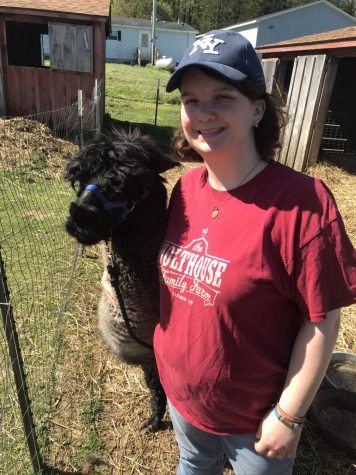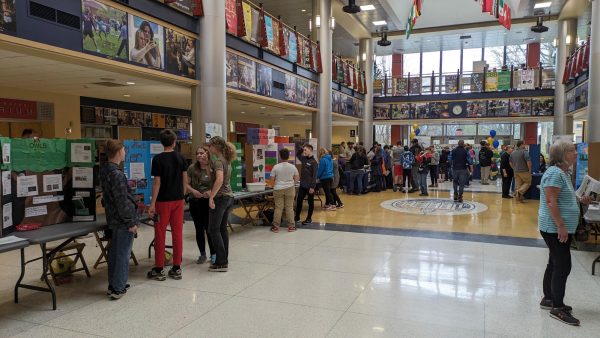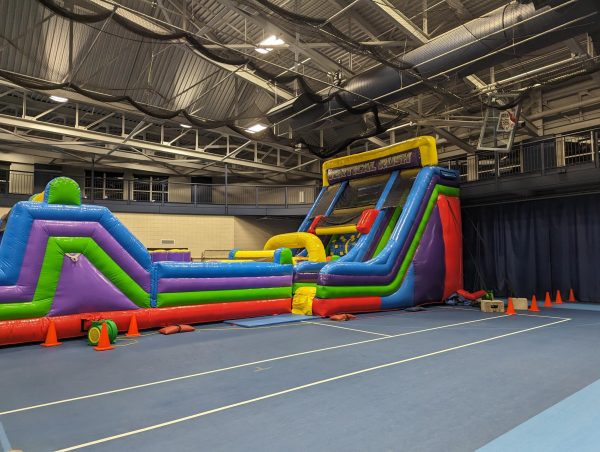Campus conversation: Talking with ‘Hamilton’ performer, visiting speaker Clark
Performer Bryan Terrell Clark visited Allegheny College’s campus as a part of his current speaking tour to give a lecture titled, “Finding Your Purpose: From Baltimore to Broadway’s Hamilton,” at 7 p.m. on Wednesday, Feb. 26. Clark also gave a master class at 4:30 p.m. that same day. After the master class, The Campus sat down with Clark to talk about his tour and his beginnings as an actor.
Just so I know I have it correct, you were in “Hamilton” and are doing other projects now, including a speaking tour. Can you talk a bit about that?
It’s funny because about two years ago, I was doing kind of this deep, artistic, spiritual journey where I took 90 days and every day I was writing down what I was grateful for, and I was writing down things that I affirmed about myself, and I was writing down declarations, like things I desired. And one day I wrote down, it would be cool to be like Baby Oprah. The very next day, a friend of mine had guests that were coming to see “Hamilton,” and he asked if I could give them a tour backstage. My friend is a professor at (New York University). He’s also a speaker, and those guests were his agents. They came backstage, and they said, “Hey, we heard you just went back to your alma mater and spoke.” And I said, “Yeah I did.” And they said, “do you do any other speaking?” I said, “Yeah I just came back from another university, and I was speaking there because my professor from Yale is now the head of their program.” And they said, “So you do this speaking thing a lot?” And I said, “Yeah.” And they said, “We would love to work with you, has Frank told you who we work with?” I said, “Yeah, you work with Frank.” They said, “We work with Barack Obama.” I literally almost peed my pants.
And so the journey has been great, I’ve done great work with this great agency called Keppler, and I really believe that along with my passions and deep purpose as an artist, I … feel that I have great passions and deep purpose when it comes to education, young artists, young people in general, in terms of education but also (as a speaker for) social justice and arts advocacy. This speaking tour is a way that I can connect with those passions just as much as the others, so I’m really grateful to be on this tour right now.
I say this often in these speeches, I think it’s our job as mentors and parents and guides to sit back and listen to what the natural passions and the natural proclivities of the people that we are assigned to are.
— Bryan Terrell Clark, Actor
I know you’ve done much more than “Hamilton,” but what has been your favorite or most exciting moment in your career, “Hamilton” or otherwise?
The most exciting moment in my career was a film that I did right after my first run in “Hamilton.” It was a Netflix movie called, “When They See Us”. And I remember during that time that I was journaling, I wrote down on another day, that it would be cool to do a film or television show that feels to me as important as “Hamilton” is. “When They See Us” is a film made by Ava DuVernay created for Netflix that is all about the Central Park Five case, where these very young men were thrown into prison and accused of a crime they didn’t commit. Initially, I auditioned for this romantic character that ended up getting cut down to basically a montage, and I didn’t get that role. I got this message from her, saying “Hey would you mind coming in for this other role?” And I (thought) to myself, I will pass out donuts on set, what are you talking about? I think she’s amazing, she’s a brilliant artist, and I’ve been wanting to work with her for some time. Then I read the scene that she sent. Essentially, I thought I was going to play this lover character, and I ended up playing this corrections officer who is hovering over one of the young men with this page and a half to two page monologue where he’s essentially telling this man that he doesn’t have a choice, and he has to stay in solitary confinement and survive or come out there with me. He compares it to Jim Crow, America and apartheid. It sent chills up my spine because it was such a dark character and such a heavy weighted character compared to what I originally auditioned for, but the character and the piece were transformative for me because it was the first time that I had ever been involved in something in television and film that to me had the cultural impact that a piece like “Hamilton” has.
How did you get started acting?
It’s funny because I’m going to talk about this tonight. My mother made me do those silly Christmas and Easter poems growing up, and it was always embarrassing — I always felt crazy and awkward. That really was the start, and I asked my mother not too long ago (about when I first said) that I wanted to be an actor. When did I first mention that I wanted to sing or be involved in the arts at all? And she said, “It was before you could talk.” … She said, “You would run up to the television and your favorite shows would be on, and you would just bounce. Or I would turn on the radio, and you would run over and just bounce.” And I say this often in these speeches, I think it’s our job as mentors and parents and guides to sit back and listen to what the natural passions and the natural proclivities of the people that we are assigned to are. And we’re supposed to help guide them to the path that allows them to express that. I think that if you look at every single child, like I’m thinking about my niece and my nephew, and I think about how beautiful their spirits are, but also how different they are. If you sit back and you watch them and you listen to them, they’re telling you over and over all the time the things that they are interested in. I think it’s our job to sit back and help guide that as opposed to putting on them what we think we want them to do. And so I think it was at a very early age that my mother, as a great educator and as a great mother, was able to kind of foster and guide my journey as an artist.
What advice do you have for students here?
I would say my biggest advice, and I’m going to talk about this more tonight, is to follow your passion. Follow your passion, because it leads to purpose. Most of the adults that I run into in life, and it doesn’t matter what part of the world that you’re in, it doesn’t matter your class or economic status, most adults are not happy. They’re not, not consistently. Usually it’s because they’re not in alignment with their passion, or they’ve forgotten or ignored it. Or they do know what their passions are but they have no sense of purpose, no reason why — they don’t know why they’re here, they don’t know why they’re doing what they’re doing. And I find that real happiness, real contentment, real fulfillment comes from following your passion because it leads to your purpose, and so that’s what I would give as advice to any student that I come across. I would say follow your passion, because it leads to a level of purpose, and that’s where happiness lies, somewhere in between.
How long was your run as George Washington, and do you have any favorite moments from on set?
I feel like I’m still running as George Washington. The first time, I did it for two years, and for a small amount of time I was — and I think still am — the longest running George Washington on Broadway. But I did it for two years on Broadway, and I just did it for six weeks during this holiday season, so for the second time not too long ago. I think George Washington in the role has taught me a lot about what it means to be a leader, and I think a different kind of leader than I had the idea of leadership for. I feel that, to be honest, a lot of my favorite moments were my first moments. When I go on as George Washington, there’s a big song that I sing in Act Two called “One Last Time.” And I was singing “One Last Time” while Barack Obama was doing his “one last time” speech in Chicago. I, as an African American man, was playing the first president as our first African American president was giving his final speech at the same time. It was a serendipitous moment. I knew at that time that it was going to be a special experience for me.
Is there anything else you’d like to add?
I think that the last thing I would like to add is when you’re in a college setting or university setting this is the time when you are supposed to be in a safe space to begin to critically think for yourself. That’s one of the hardest things to do, because for a long time your conscious or inner being sounds like your parents or any other authority figure. The last thing that I would say is that the best gift you can give yourself is to get in touch with whatever your inner voice is, because it’s kind of the compass for your life. We are the only creatures on the planet that I know of that can override our instincts with our minds. We all have gut reactions to things. We say, “Oh I knew there was something off about that person,” but we look back a year and a half later and say, “Yeah that was a horrible relationship, but if I’m honest I knew from day one,” or “I knew I shouldn’t have taken this job” or “I knew I shouldn’t have turned down that alley.” Whatever it is, I feel like (it’s) our gut, you know a lot of people say (to) follow your gut. I would say that while you’re here in a university atmosphere, this is something that you’re going to have to do for the rest of your life, train yourself to trust your gut. Train yourself to listen to your inner voice because you need to train yourself to be okay with listening to your inner voice and following that. And I’ll just give you some of my ways, but you have to find your own way. And that’s honestly why I like being an artist versus being a teacher, because I could’ve easily fallen into that track, but it’s cool being an artist because I am just telling you as (one) human being to another human being that this is what my experience is, and this is what I’ve done, but you’ve got to find your way of doing that. It’s not prescriptive. I think any time you try to be prescriptive it doesn’t always work. I think that’s what I want young people to get out of (my talk). It’s something about your late teens, early twenties, that exploratory time that really is about you defining life and defining yourself from within. Because (for) most of your life, most of society is trying to define you from the outside. It’s trying to tell you what you are supposed to do. It never leads to fulfillment. And I think that there is a balance to that, but I think you as a person who is uniquely living your life experience, there’s only one you on the planet and no one else that’s going to see the world and life through the eyes that you see it. That’s a special thing. I think you have to begin to, especially around this age, you have to begin to take that journey for yourself, and take accountability for sitting in the driver’s seat of your life, and not just having life kind of thrown at you. You get to make the decisions about what you want your life to be. It’s an empowering time, and it’s a time that us adults need to be reminded of. That’s what I would leave the folks with.

Sara Holthouse is a senior from Panama, NY. This is her third year/final semester on staff, where she has previously served as news editor for the past...






